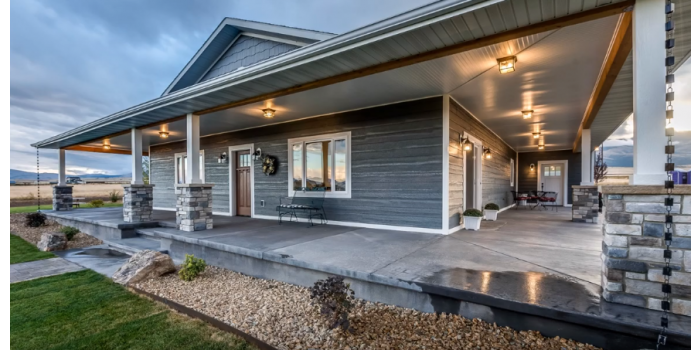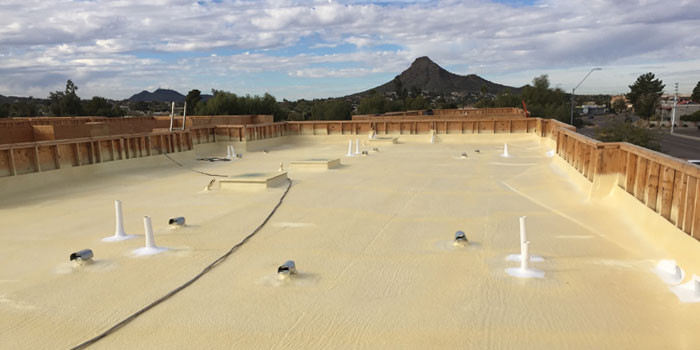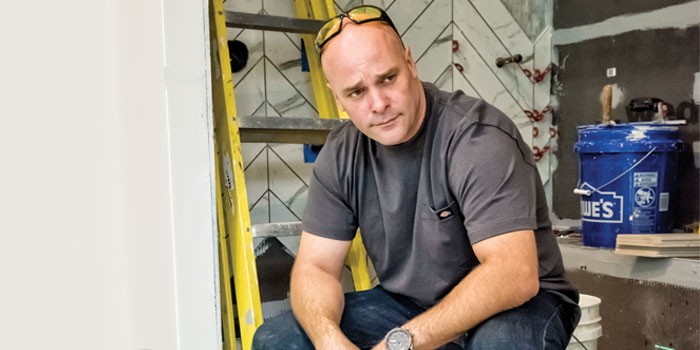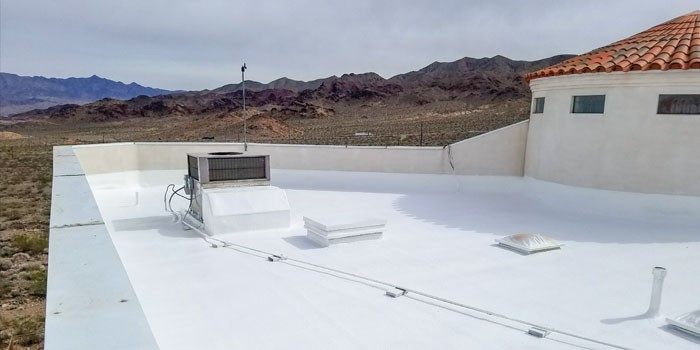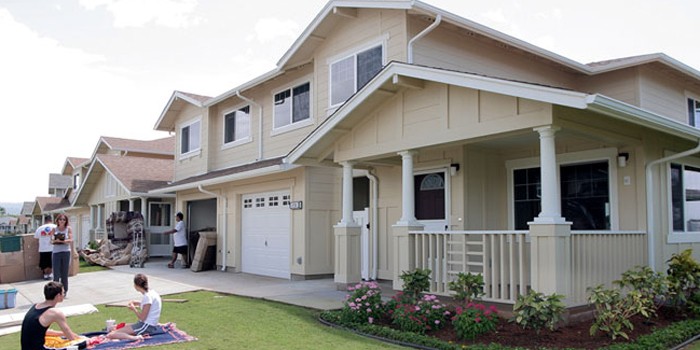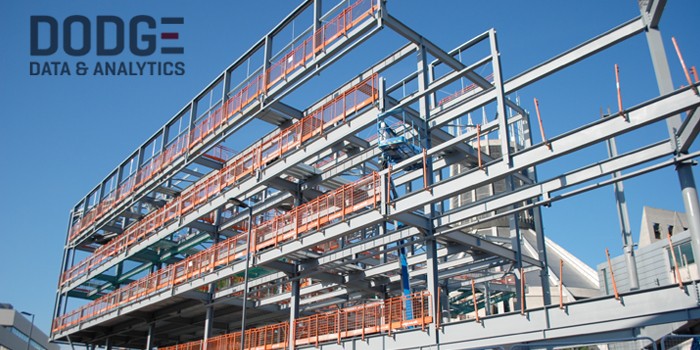
New Construction Starts Climb 13 Percent
NEW YORK, NY – December 16, 2015 – New construction starts in October advanced 13% to a seasonally adjusted annual rate of $591.1 billion, according to Dodge Data & Analytics. The increase follows the lackluster performance for construction starts during August and September, when activity fell to the lowest levels reported so far in 2015. Much of October’s gain for total construction was due to a sharp rebound by nonresidential building, with additional support coming from a moderate upturn for housing as the result of further strengthening by multifamily housing. At the same time, the nonbuilding construction sector (public works and electric utilities/gas plants) settled back in October, reflecting a decreased amount of power plant projects. During the first ten months of 2015, total construction starts on an unadjusted basis were $551.9 billion, up 10% from the same period a year ago. Leaving out the volatile electric utility and gas plant category, which was boosted in early 2015 by the start of several massive liquefied natural gas (LNG) terminals, total construction starts during the first ten months of 2015 would be up 4% relative to last year.
October’s data raised the Dodge Index to 125 (2000=100), compared to 111 in September. “The healthy increase for construction starts in October alleviates concern about a stalling expansion that may have arisen with the sluggish activity in August and September,” stated Robert A. Murray, chief economist for Dodge Data & Analytics. “The construction start statistics do show volatility on a month-to-month basis, and as a result trends in the near term are rarely smooth. On balance, though, factors within the economic and political environment still point towards the continued expansion for construction. For the nonresidential building market, the primary drivers for its commercial and institutional building segments remain positive. The U.S. economy continues to register moderate job growth, vacancy rates are receding, rents are rising, and construction-related bond measures at the state level are getting passed. For residential building, multifamily housing is still a target for investors while Millennials are lifting the demand for apartments. For public works, there’s been solid progress made by Congress towards finalizing the next federal multiyear transportation bill and there’s less uncertainty with the selection of Paul Ryan as the new Speaker of the House of Representatives, although fiscal 2016 appropriations still need to be passed.”
Nonresidential building in October jumped 32% to $200.7 billion (annual rate) after a weak September, returning activity to the level that was reported back in June following three months of decline. The commercial building categories as a group soared 49% in October, reflecting across-the-board gains. Store construction surged 56%, pushed upward by the $561 million expansion and renovation of the Westfield Century City Mall in Los Angeles CA. Office construction advanced 45%, helped by the start of two large data center projects – the $570 million Facebook data center (phase 1) in Ft. Worth TX and the $300 million expansion to the Google data center in Lithia Springs GA. More typical office projects that reached groundbreaking in October included a $400 million office building in New York NY, a $128 million addition and renovation to an office building in Washington DC, and a $100 million corporate headquarters in Des Moines IA. Hotel construction grew 28%, aided by the start of the $350 million McCormick Place Marriott Marquis Hotel in Chicago IL and the $87 million Renaissance Legacy Hotel in Plano TX. Warehouse construction improved 24%, supported by the start of the $130 million Dollar Tree distribution center in Cowpens SC plus two Amazon distribution centers located in San Marcos TX ($90 million) and Fall River MA ($45 million). And, the garage and service station category contributed to October’s commercial upturn, climbing 119% due to the start of two large consolidated rental car facilities located at Chicago’s O’Hare International Airport ($400 million) and San Antonio’s International Airport ($106 million).
The institutional side of the nonresidential building market climbed 23% in October. The educational facilities category increased 21%, led by the start of the $285 million Rockefeller University River Campus in New York NY and a $70 million science lab at the University of Tennessee in Knoxville TN. October also featured the start of several large high schools, including projects located in Cypress TX ($120 million), Frisco TX ($86 million), and Charleston SC ($64 million). Healthcare facilities in October rose 18%, as three projects valued in excess of $100 million reached groundbreaking – a $160 million hospital addition in Phoenix AZ, a $139 million hospital addition in Livingston NJ, and a $138 million medical center in O’Fallon IL. Of the smaller institutional categories, October gains were registered by public buildings, up 25%; amusement-related work, up 17%; and churches, up 5%. Transportation terminal work was the one institutional category to report an October decline, sliding 5%. The manufacturing building category also lost momentum in October, retreating 15%, although the latest month did include the start of an $80 million manufacturing facility for Kubota in Gainesville GA.
Residential building, at $260.3 billion (annual rate), grew 9% in October. Multifamily housing bounced back 42% after an unexpectedly subdued September, coming within 6% of its average pace during the first nine months of this year. While September had just two multifamily projects valued at $100 million or more that reached groundbreaking, October had 11 such projects. The major multifamily projects in October showed a varied geography, and the largest continued to be located in the New York NY metropolitan area – a $350 million apartment building in Long Island City NY. The next five largest projects were located outside of the New York NY metropolitan area – a $270 million condominium building in Chicago IL, a $253 million apartment building in Seattle WA, two apartment buildings in Dallas TX valued at $156 million and $130 million respectively, and a $141 million condominium building in San Diego CA. Murray noted, “While the multifamily strength during much of 2015 has been dominated by major projects in the New York City area, the pattern in October suggests that the multifamily expansion is now widening in geographic scope.” Through the first ten months of 2015, the top five metropolitan areas ranked by the dollar amount of multifamily starts were as follows – New York NY, Miami FL, Los Angeles CA, Washington DC, and Boston MA. Multifamily metropolitan areas ranked 6 through 10 were Seattle WA, Chicago IL, Dallas-Ft. Worth TX, Houston TX, and San Francisco CA. Single family housing in October was unchanged from September, and in a broad sense has been essentially flat during the most recent six months after showing steady improvement earlier in 2015. The October pace for single family housing remained 13% higher than the average monthly amount reported during 2014. By major region, single family housing in October showed gains in the Midwest and Northeast, each up 5%; no change in the South Atlantic; and declines in the West, down 1%, and the South Central, down 5%.
RELATED New Study Suggests Strong Outlook for Green Homes, Sprayfoam 2016 Announces Keynote Speaker Richard Rawlings, BPI Sponsors 16-City Proof is Possible Tour
Nonbuilding construction in October dropped 3% to $130.2 billion (annual rate). The reduced volume was due to a 21% pullback for the electric utility and gas plant category from a fairly healthy amount in September (the fifth highest during 2015’s first ten months). Even with this retreat, October still included the start of several major power plant projects, led by a $775 million natural gas-fired power plant in Maryland, a $600 million wind farm in Nebraska, and a $402 million solar power facility in Georgia. The public works categories in October grew 4%, showing further improvement after September’s slight 1% gain which followed double-digit declines in July and August. The upward momentum for public works in October came from a 43% jump for sewer construction, lifted by a $153 million expansion to a sewage treatment plant in Hartford CT; and a similar 42% jump for water supply construction, lifted by a $440 million pumping station at Lake Mead in Boulder City NV. The third environmental public works category, river/harbor development, slipped 10% in October. The miscellaneous public works category, which includes such diverse project types as site work, mass transit, and pipelines, was unchanged in October from its September amount. The latest month did include the start of one noteworthy mass transit project – $223 million for phase 2 of the Dulles Corridor MetroRail project in northern Virginia. Highway and bridge construction in October receded 5%, not able to regain upward momentum after the slower pace that took hold during July and August.
The 10% increase for total construction starts on an unadjusted basis during the first ten months of 2015 was the result of double-digit gains for residential building and nonbuilding construction, while nonresidential building was down moderately after registering a substantial 24% hike for the full year 2014. Residential building advanced 15% year-to-date, with multifamily housing up 19% and single family housing up 13%. Nonbuilding construction year-to-date climbed 29%, with electric utilities and gas plants up 201% while public works was flat. The substantial year-to-date increase for nonbuilding construction has become smaller as 2015 has proceeded. Nonresidential building year-to-date settled back 6%, due mostly to a 31% plunge for the manufacturing building category. The commercial building group year-to-date was steady with its 2014 amount, while the institutional building group was down a modest 3%. By major region, total construction starts during the first ten months of 2015 showed this performance – the South Central, up 21%; the Northeast, up 18%; the South Atlantic, up 9%; the West, up 4%; and the Midwest, up 1%.

About Dodge Data & Analytics: Dodge Data & Analytics is the leading provider of data, analytics, news and intelligence serving the North American construction industry. The company’s information enables building product manufacturers, general contractors and subcontractors, architects and engineers to size markets, prioritize prospects, target and build relationships, strengthen market positions, and optimize sales strategies. The company’s brands include Dodge, Dodge MarketShare™, Dodge BuildShare®, Dodge SpecShare®, and Sweets. To learn more, visit www.construction.com.

